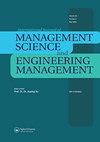Decision-making through fuzzy TOPSIS and COPRAS approaches for lean tools selection: A case study of automotive accessories manufacturing industry
IF 3
Q2 OPERATIONS RESEARCH & MANAGEMENT SCIENCE
International Journal of Management Science and Engineering Management
Pub Date : 2022-04-21
DOI:10.1080/17509653.2022.2064356
引用次数: 2
Abstract
ABSTRACT Similarity in prioritization of lean tools (LTs) by different frameworks on the same problem is a point of contention. The goal of the present research is to address LT selection problem through two commonly used multi-criteria decision-making approaches, namely the technique for order preference by similarity to ideal solution (TOPSIS) and complex proportional assessment (COPRAS). A framework involving value stream mapping and plant layout through TOPSIS and COPRAS approaches to find the best possible LTs for an automotive accessories manufacturing plant is developed and assessed in this research. The obtained similarity of rankings betweenTOPSIS and COPRAS is 71.42%, and the difference is 28.58%. Based on the assessment, systematic layout planning (SLP) is selected as the most suitable LT and its implementation is elaborated in detail. Significant reductions were obtained in lead time (16.44%), non-value added time (61.03%), transportation distances (40.42%), and waiting time (86%). Additionally, lean implementation resulted in reduced inventory, reduced internal traffic, improved productivity, and improved customer service. The LT selection framework presented in this research work addresses the computational complexity associated with the existing models and allows the segregation of the most preferable and the least preferable criteria which eliminate the criteria weight generation methods.基于模糊TOPSIS和COPRAS方法的精益工具选择决策:以汽车配件制造业为例
不同框架对同一问题的精益工具(lt)优先级的相似性是一个争论点。本研究的目的是通过两种常用的多准则决策方法,即理想解相似性排序偏好技术(TOPSIS)和复杂比例评估技术(COPRAS)来解决LT选择问题。通过TOPSIS和COPRAS方法,开发并评估了一个涉及价值流映射和工厂布局的框架,以找到汽车配件制造工厂的最佳可能ltt。得到的entopsis与COPRAS的排序相似性为71.42%,差异为28.58%。在评估的基础上,选择系统布局规划(SLP)作为最合适的规划方式,并详细阐述了其实施。在交货时间(16.44%)、非增值时间(61.03%)、运输距离(40.42%)和等待时间(86%)方面均有显著降低。此外,精益实现还减少了库存、减少了内部流量、提高了生产率并改善了客户服务。本研究工作中提出的LT选择框架解决了与现有模型相关的计算复杂性,并允许分离最理想和最不理想的标准,从而消除了标准权重生成方法。
本文章由计算机程序翻译,如有差异,请以英文原文为准。
求助全文
约1分钟内获得全文
求助全文
来源期刊

International Journal of Management Science and Engineering Management
OPERATIONS RESEARCH & MANAGEMENT SCIENCE-
CiteScore
8.50
自引率
33.30%
发文量
40
期刊介绍:
International Journal of Management Science and Engineering Management (IJMSEM) is a peer-reviewed quarterly journal that provides an international forum for researchers and practitioners of management science and engineering management. The journal focuses on identifying problems in the field, and using innovative management theories and new management methods to provide solutions. IJMSEM is committed to providing a platform for researchers and practitioners of management science and engineering management to share experiences and communicate ideas. Articles published in IJMSEM contain fresh information and approaches. They provide key information that will contribute to new scientific inquiries and improve competency, efficiency, and productivity in the field. IJMSEM focuses on the following: 1. identifying Management Science problems in engineering; 2. using management theory and methods to solve above problems innovatively and effectively; 3. developing new management theory and method to the newly emerged management issues in engineering; IJMSEM prefers papers with practical background, clear problem description, understandable physical and mathematical model, physical model with practical significance and theoretical framework, operable algorithm and successful practical applications. IJMSEM also takes into account management papers of original contributions in one or several aspects of these elements.
 求助内容:
求助内容: 应助结果提醒方式:
应助结果提醒方式:


